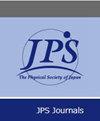Seebeck Effect of Dirac Electrons in Organic Conductors under Hydrostatic Pressure Using a Tight-Binding Model Derived from First Principles
IF 2.2
4区 物理与天体物理
Q2 PHYSICS, MULTIDISCIPLINARY
引用次数: 0
Abstract
The Seebeck coefficient is examined for two-dimensional Dirac electrons in the three-quarter filled organic conductor α-(BEDT-TTF)2I3 [BEDT-TTF denotes bis(ethylenedithio)tetrathiafulvalene] under hydrostatic pressure, where the Seebeck coefficient S is proportional to the ratio of the thermoelectric conductivity L12 to the electrical conductivity L11, i.e., S = L12/TL11 with T being the temperature. We present an improved tight-binding model in two dimensions with transfer energies determined from first-principles density functional theory calculations with an experimentally determined crystal structure. The T dependence of the Seebeck coefficient is calculated by adding impurity and electron–phonon scatterings. Noting a zero-gap state due to the Dirac cone, which results in a competition from contributions between the conduction and valence bands, we show positive Sx and Sy at finite temperatures and analyze them in terms of spectral conductivity. The relevance of the calculated Sx (perpendicular to the molecular stacking axis) to the experiment is discussed.利用从第一原理推导出的紧密结合模型研究静水压力下有机导体中狄拉克电子的塞贝克效应
我们研究了静水压力下四分之三填充有机导体 α-(BEDT-TTF)2I3 [BEDT-TTF 表示双(亚乙二硫基)四硫代富勒烯] 中二维狄拉克电子的塞贝克系数,其中塞贝克系数 S 与热电导率 L12 与电导率 L11 之比成正比,即 S = L12/TL11,T 为温度。我们提出了一种改进的二维紧密结合模型,其传递能量是通过第一原理密度泛函理论计算和实验确定的晶体结构确定的。通过添加杂质和电子-声子散射,计算出了塞贝克系数的 T 依赖性。我们注意到由于狄拉克锥的存在,导带和价带之间的贡献会产生竞争,从而导致零间隙状态,因此我们在有限温度下显示出正的 Sx 和 Sy,并从光谱电导率的角度对它们进行了分析。我们还讨论了计算出的 Sx(垂直于分子堆积轴)与实验的相关性。
本文章由计算机程序翻译,如有差异,请以英文原文为准。
求助全文
约1分钟内获得全文
求助全文
来源期刊
CiteScore
3.40
自引率
17.60%
发文量
325
审稿时长
3 months
期刊介绍:
The papers published in JPSJ should treat fundamental and novel problems of physics scientifically and logically, and contribute to the development in the understanding of physics. The concrete objects are listed below.
Subjects Covered
JPSJ covers all the fields of physics including (but not restricted to)
Elementary particles and fields
Nuclear physics
Atomic and Molecular Physics
Fluid Dynamics
Plasma physics
Physics of Condensed Matter
Metal, Superconductor, Semiconductor, Magnetic Materials, Dielectric Materials
Physics of Nanoscale Materials
Optics and Quantum Electronics
Physics of Complex Systems
Mathematical Physics
Chemical physics
Biophysics
Geophysics
Astrophysics.

 求助内容:
求助内容: 应助结果提醒方式:
应助结果提醒方式:


